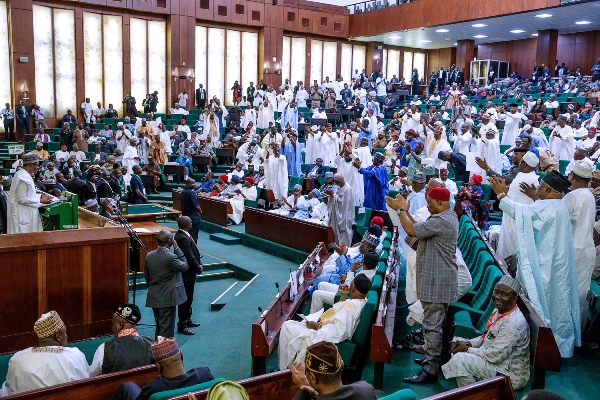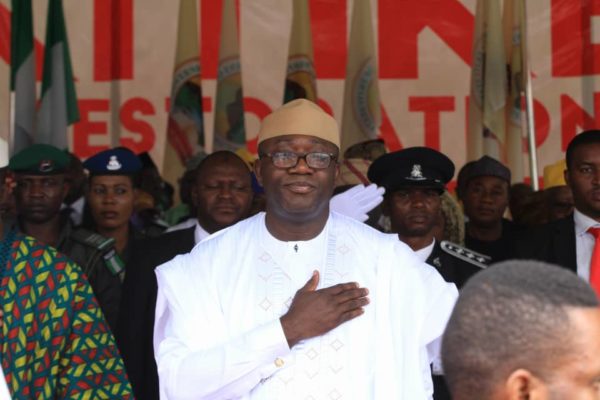
The stringent guidelines released by Nigeria’s National Assembly (NASS) for the accreditation of journalists, has caused an uproar in the country.
The lawmakers rolled out the guidelines which journalists must meet before they are accredited to cover activities in the two chambers NASS.
According to the guidelines, media organisations and journalists would not be allowed to cover the activities of the Assembly until they comply with conditions for fresh accreditation before June 11, 2019, the day of the inauguration of the 9th assembly –Senate and House of Representatives.
Senate President Bukola Saraki denied knowledge of the guidelines and explained that the move is an indication that leadership of NASS does not determine what happens.
“This is a demonstration of the fact that the political leadership of National Assembly does not decide most of the things that happen there (National Assembly management). This is definitely news to me, even as head of the media team of the chairman of the National Assembly.
“It is perhaps a new policy that will be in force from June 11 when the new National Assembly will be inaugurated. In any case, I will still try to give advice to the relevant people on an issue which I consider as bordering on press freedom and access to information,” he said.
The guidelines were unveiled by the director of information at the National Assembly, Mr. Agada Emmanuel.
He said a media organisation must submit a copy of its income tax return for the last two years. A newspaper house must also show evidence that it circulates at least 40,000 copies daily.
A media organisation must have a certificate of incorporation; membership of professional bodies for media organisation; proof of membership of the Nigeria Union of Journalists (NUJ) backed by registration number, and a code of certification from the National Library.
“With this new guidelines in place, all previous accreditations granted to journalists covering the National Assembly will lapse with the dissolution of the eighth Assembly,” he said in a statement on Monday.
According to him media organisations must have a functional bureau in Abuja with staff strength of not less than five editorial staff as well as daily circulation of 40,000 copies for the print media with evidence to support the claimed circulation figure. Media houses must be publishing daily and on weekends (applicable to online media).
Media organisations must have had experience covering proceedings of the National Assembly for at least two years before applying for a permanent accreditation.
“All online media must have at least 5000 viewership per day. The site must have been in operation for five years and provide satisfactory evidence to this effect with clippings of the news utilised (especially parliamentary news).
“Only television stations with national coverage and specific independent producers with current running programmes on the National Assembly will be allowed access into the chambers on a permanent basis (all the production crew will be accredited as an entity).
“All correspondents must attach photocopies of letters of appointment of the media organisation on whose behalf request has been received for accreditation. All freelance journalists seeking permanent accreditation must show evidence of not less than five years coverage of the National Assembly’s proceedings, full editorial focus, and publication on parliamentary reportage.”
“Only television stations with national coverage and specific independent producers with current running programme on the National Assembly will be allowed access into the Chambers on a permanent basis (All the production crew will be accredited as entity).
“All correspondents must attach photocopy of letter of appointment of the media organisation on whose behalf, request has been received for grant of accreditation.
“All freelance journalists seeking permanent accreditation must show evidence of not less than five years coverage of the National Assembly proceedings/full editorial focus and publication on parliamentary reportage.
The National Assembly equally stated that only journalists and correspondents whose organisations meet the above requirements for permanent accreditation would be entitled to National Assembly identity cards/membership of the press corps.
“All foreign/international media houses seeking accreditation shall abide by all the diplomatic protocols established by the Ministry of Foreign Affairs for foreign media organisations, the Code of Ethics for Nigerian journalists and security clearance before accreditation will be considered upon recommendation from the foreign affairs ministry.”
These move of NASS has infuriated the Nigerian Guild of Editors (NGE) which in a a statement signed by its General Secretary, Ms Mary Atolagbe, rejected the new guidelines, describing them as primitive, undemocratic, blatantly anti-press and anti-people.
“The Guild finds this vexatious, disrespectful and draconian. It is a scurrilous attempt to gag the press in a democracy and it cannot stand.
These guidelines run contrary to the grains of reason, democratic ideals and they are a clear affront on the letter and spirit of the Nigerian constitution, which empowers journalists to freely practice their profession without any gag, muzzling and restriction,” the statement reads.
“The National Assembly guidelines negate the constitutional principle of freedom of expression and run contrary to the African Charter on fundamental rights and the right of the people to know. The Guild strongly objects to these guidelines in their entirety, as they serve no public good except the myopic interest of its chroniclers and purveyors.
The Guild is disappointed that the same eighth National Assembly, which benefited immensely from free press in its moments of trial, has turned round to put the same press in shackles and chains. We reject this crude abrasion of our constitutional rights to freely disseminate information. It cannot stand.
The Guild urges all media houses across the nation to rise up and reject this medieval intrusion into the media space in the 21st century, much more in a democracy, which the Nigerian media doggedly fought for and for which some journalists paid the supreme price.”
It said that the guidelines ran contrary to the grains of reason, democratic ideals and they are a clear affront on the letter and spirit of the Nigerian constitution which empowers journalists to freely practice their profession without any gag, muzzling and restriction.
The Guild expressed disappointment that the same 8th National Assembly which benefited immensely from free press in its moments of trial has turned around to put the same press in shackles and chains.
The opposition Peoples Democratic Party (PDP) which presently controls the National Assembly and the Nigerian Union of Journalists (NUJ) have flayed the management of NASS.
The NUJ issued a 24 hours ultimatum to the National Assembly to withdraw the guidelines which it described as satanic.
The National President of NUJ, Mr Christopher Iziguzo, said the action of the Assembly was against the spirit of free press and declared: “We have given the National Assembly 24-hours within which to withdraw the satanic guidelines. The guidelines are meant to stifle the press. We will not accept it.
“It is unfortunate that this is coming from the National Assembly that we are all expecting to promote democracy.
“Its action is against the spirit of free press and we will not accept it. It is sad that the lawmakers will allow this to come from them.”
The National Chairman of the PDP, Mr Uche Secondus, described some of the conditions as “poisonous and unbelievable”.
“The colonial masters never asked for such devilish conditions when the country was under colonial rule,’’ he said.
Appealing to management of the Assembly to withdraw the guidelines, he said: “I was taken aback when the guidelines were shown to me. It is unbelievable. How can we have such under a democratic government? Are we in another man’s country or not?
“Those guidelines are poisonous and should be rejected. I want to appeal to the drafters of such guidelines withdraw them immediately and even apologise to the Nigeria people.
“When we were under the colonial rule, I’m not sure we had such draconian rules. Nigeria media should rise up and defend democracy. Nigerians should say no to such devilish conditions.”
The former 2nd Vice-President of the Nigerian Bar Association, Mr Monday Ubani, said the “onerous accreditation requirements” were aimed at killing the constitutional right of the media to freedom of expression and to hold government accountable.
He described the move as clearly illegal, null and void.
“I think they are trying to kill the freedom of expression. The constitution guarantees the media’s right to hold the government accountable under the fundamental objective directive principle.
“There is also the right of freedom of expression under the fundamental human rights provisions.’’
The government of Nigeria has yet to react to the situation.














